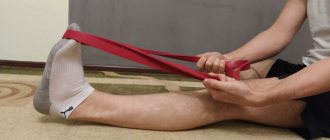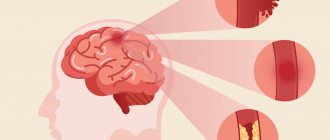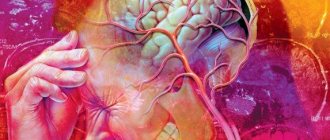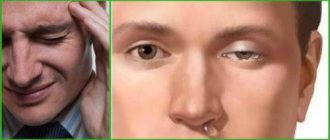Content:
- Causes of numbness
- Typical clinical picture
- Other symptoms
- Treatment
Alcohol in excessive quantities has a negative effect on all organs. The nervous system is also very sensitive to its effects - central (CNS), as well as peripheral. One of the consequences of this effect on the nerve structures is numbness after heavy drinking, which is felt in the hands.
At first it is insignificant, then it progresses - it causes discomfort and interferes with performing various types of work with your hands.
There is another side to the “coin”: such a feeling is not only unpleasant in itself, but can signal the possible development of a stroke.
Treatment of numbness at the MART clinic
The reason for contacting the neurologists of the MART medical center is numbness in any area that occurs periodically without any apparent reason and lasts more than 1-5 minutes.
Doctors at our medical center, depending on the causes of numbness identified during the diagnosis process, can use manual therapy, physiotherapy, acupuncture, exercise therapy and other methods of conservative therapy to treat this condition. The course of treatment in each case is selected strictly individually.
By turning to the MART clinic for help in a timely manner, you can accurately determine the cause of the disturbing symptoms, quickly take appropriate measures and prevent the development of possible complications.
Sign up at the MART medical center in St. Petersburg (see map) by phone, or leave a request on the website.
Causes of numbness
In alcoholics, this pathology occurs due to acetaldehyde. This organic substance is formed in the body as a result of the breakdown of ethanol. Acetaldehyde is characterized by pronounced toxic properties. During an alcoholic binge, it is not completely eliminated from the body (in addition, the liver, damaged due to prolonged use of alcoholic beverages, does not fully neutralize it), it enters the organs and tissues through the bloodstream and poisons them.
Numbness due to the toxic properties of acetaldehyde occurs for two main reasons - due to its influence:
- on the structures of the central nervous system;
- directly to the nerve endings in the soft tissues of the hands.
Once in the brain, this substance disrupts intracellular processes. Because of this, the functions of the organ suffer significantly, including the function of recognizing and evaluating impulses that come from various structures. This mechanism of occurrence of the described pathology is called central.
In addition, acetaldehyde enters the soft tissues of the hands through the bloodstream, where it affects peripheral nerve endings. Impulses through them begin to be transmitted to the brain centers with malfunctions - the hands become numb, and other symptoms also appear.
There are several mechanisms of the negative impact of acetaldehyde - this effect is:
- directly on the nerve fibers of the hands;
- on the myelin sheaths covering them;
- on brain tissue;
- on its vessels, because of which the blood supply to the brain structures suffers with all the ensuing consequences.
The left hand goes numb: causes associated with pathology
Sometimes paresthesia signifies the presence of a serious illness. Its occurrence in one half of the body should be especially alarming. Why is it dangerous when your left hand goes numb? Perhaps these are problems with the heart or blood vessels (heart attack, angina, hemorrhage in the right hemisphere of the brain).
If the manifestation is accompanied by pain in the heart, a burning sensation under the shoulder blade, coordination and speech disorders, you need to call the ambulance service.
The left hand goes numb, the reasons may be:
- Blockage of an artery by a blood clot (cholesterol plaque).
- Vascular aneurysm.
- Raynaud's syndrome is a difficulty in blood flow in capillaries and arterioles.
- Pathology of the spinal column.
- Carpal tunnel syndrome is compression of the median nerve in the carpal tunnel.
- Brachial plexitis is an inflammation of the nerve plexus.
- Spondylosis – bone “spikes” on the cervical vertebrae.
These diseases can progress. The result of violations can be a complete loss of sensitivity in the affected organ. It is important to consult a specialist in a timely manner for the necessary diagnosis and treatment.
Typical clinical picture
Numbness of the fingers after heavy drinking can be observed in isolation or the entire hand may become numb.
This pathology is often accompanied by distortion of sensitivity:
- painful - with mechanical impact on the tissues of the hands and fingers, pain sensations are muted or do not occur at all;
- thermal - such patients are often susceptible to frostbite and burns, because they do not feel high and low temperatures and do not control their influence;
- tactile - the patient may not feel touch.
If alcoholic delirium (fever) has developed, then tactile sensations are often distorted - up to the appearance of tactile hallucinations. An alcohol addict feels as if someone or something is touching his hands. This creates the following sensations:
- “goosebumps”;
- crawling insects;
- tickling;
- tingling (even painful);
- burning;
- superficial touch with soft or hard objects;
- blowing wind
and others.
If alcohol dependence progresses over time, then there is a high risk of developing polyneuropathies - this term refers to multiple lesions of peripheral nerves. This is usually observed in alcoholism of 2-3 degrees. Symptoms appear that are generally characteristic of polyneuropathies:
- glove-like pain in the upper extremities. Accompanied by a similar disorder in the legs, similar to “socks”;
- loss of sensitivity like “gloves” with the presence of the same “socks”;
- convulsions;
- movement disorder.
In severe cases, the hand curls.
Left hand goes numb - treatment of the problem
To determine the cause of discomfort, instrumental and laboratory examinations are performed, usually:
- radiography of the spine and joints;
- Ultrasound of vessels of the upper extremities;
- ECG;
- echocardiography;
- blood analysis.
After completing the studies, you may need to consult doctors with narrow specializations - a neurologist, cardiologist, vascular surgeon, vertebrologist. Based on the results, drug therapy, physiotherapy, and diet are prescribed.
Other symptoms
If numbness in the hands after binge drinking occurs due to a pathology of the central nervous system, then other clinical symptoms may occur, including not only in the hands. Observed:
- change in gait;
- deterioration in the mobility of the fingers of the upper and lower extremities;
- feeling of weakness in half of the body.
Caution should arise if:
- headache;
- dizziness;
- nausea;
- diplopia (double vision);
- difficulty swallowing (even when trying to swallow liquid);
- speech disorder;
- feeling as if the tongue is pulling;
- insomnia.
Such failures indicate the possible development of a stroke - a cerebrovascular accident.
Causes of paresthesia
Goose bumps on the face are not a disease, but only a symptom of another primary process or a consequence of a provoking factor. It can occur in various areas of the face and occurs in combination with other manifestations, for example, burning, muscle rigidity, swelling. Paresthesia is sudden, temporary or permanent, mild or severe. In the latter case, there is not paresthesia, but complete paralysis of the face.
Most cases of numbness on the right or left side of the face are due to circulatory problems in the head or neck and diseases associated with the central nervous system. However, temporary factors are no exception, after the elimination of which the symptom disappears.
Temporary, not caused by diseases
Only a doctor can rule out diseases of the central nervous system and other body systems as the cause of tingling on the face based on the results of a comprehensive diagnosis. Temporary causes of paresthesia include:
- Sleeping on an uncomfortable pillow. If for a long time, for example, throughout the night, you take one position of your head to sleep (on your side), you can wake up in the morning with a feeling of numbness and trembling. This can be explained by the fact that nerves and blood vessels are compressed. This causes the development of paresthesia.
- Increased irritability, behavior characteristic of stress. Often, during an emotional conversation, a person contracts his facial muscles, which contributes to the appearance of muscle hypertonicity and, as a result, numbness in this area.
- Anxiety syndrome, anxiety before an important event, for example, before an exam. In such cases, sensitivity is lost due to nervous overstrain.
- Engagement in professional activities that require the head and neck to assume a monotonous position for a long time. These could be professions that require long periods of work at a computer; reading, handicrafts for several hours in a row. In such cases, it is recommended to take breaks from time to time and perform exercises for the cervical spine and head.
- Colds. The right or left side of the face becomes numb as a result of muscle inflammation, which is a complication of ARVI or acute respiratory infections.
- Hypothermia. The symptom is caused by vasospasm. After the end of the cold and warming, it disappears.
In other cases, the left side of the face (or right) becomes numb due to the development of a vascular or neurological disease.
Pathological, requiring medical assistance
If the left side of the face is numb, and the symptom occurs frequently or on an ongoing basis, or is present for a long time, self-medication is not recommended. Paresthesia in this case may signal the development of a dangerous pathology. You should immediately call a doctor if the symptom occurs suddenly; in addition to the cheek, part of the lip, nose, chin, forehead, or head is numb. This may be a sign of a stroke, requiring urgent medical attention and specific treatment.
Other pathological reasons why the left side of the face goes numb:
- trigeminal neuritis;
- migraine;
- VSD (vegetative-vascular dystonia);
- neurosis;
- osteochondrosis of the cervical spine;
- multiple sclerosis;
- syringomyelia;
- shingles;
- inflammation of the facial nerve, for example, the temporal nerve.
In most cases of diagnosing pathological causes of paresthesia, stroke and osteochondrosis of the cervical spine occur.
In the latter case, a violation of the sensitivity of one side of the face occurs against the background of constant compression of the spinal nerve or vessel by formed salt stones. Chronic pain in the cervical region, pain in the head, slight dizziness, malaise, and a crunch in the neck when turning the head also occur.
Another common reason why numbness in the left side of the face occurs in women and men is poor circulation in the brain. This condition is considered dangerous and occurs against the background of various factors, for example, when small capillaries are blocked by cholesterol deposits, blood clots, or an aneurysm.
In adult women, acute cerebrovascular accident often occurs with long-term use of hormonal contraceptives, smoking, alcohol abuse, poor diet, and frequent migraine attacks.
Stinging on one side of the face can occur with trigeminal neuralgia. The disease develops against the background of irritation or compression of the nerve during the inflammatory process in the nose, mouth, ear area, as well as due to its contact with a tumor-like neoplasm, adhesive formations after injury. In most cases, the inflammatory process occurs in the lower branch of the nerve, so the symptom manifests itself in this area.
Often, numbness on the left or right side of the face occurs due to a stagnant process in the lymphoid fluid. The inflammatory process in the lymph nodes develops when the infection intensifies and spreads into the lymphatic system. Along with paresthesia, swelling is observed, compressing the nerves.
A less common cause of tingling on the face is sinusitis. The disease is characterized by the development of an inflammatory process in the upper maxillary sinuses, caused by an acute respiratory infection (signs - nasal congestion, sore throat, fever, etc.). In addition, the source of inflammation is the spread of infection from another primary focus, for example, from a gum pocket or a carious cavity of a tooth.
Disruption of the functioning of the central nervous system occurs against the background of insufficient content of useful substances in the body, in particular vitamins B and E. A decrease in the level of these is observed due to the development of pathologies in the digestive system (hepatitis, gastritis, enteritis, etc.). With vitamin deficiency, not only the cheeks tingle, but also the lips and chin.
Poor blood circulation in the facial area occurs after surgery or trauma to this area. In addition to superficial disorders, that is, paresthesia, there is an increased risk of developing secondary infections, the formation of abscesses, and phlegmon.
A disruption in the process of conducting nerve impulses along sensory fibers occurs due to the use of agents from the group of anesthetics. These include Lidocaine and Novocaine, and other drugs used to relieve pain symptoms in dentistry and endoscopy. A consequence of the use of these drugs is the thinning of nerve fibers due to the development of an allergic reaction.
If numbness occurs in the left side of the face and arm, this may be a sign of multiple sclerosis. Each disease of the peripheral nervous system develops against the background of activation of viral pathogens, immunodeficiency or due to food allergies. Multiple sclerosis is characterized by paralysis and impaired visual and auditory function. If left untreated at the initial stage, the disease progresses and clinical manifestations intensify.
Risk group
Relevant studies have proven that in the presence of certain diseases in the body, the risk of paresthesia increases several times. The type of life a person leads is also important.
Persons at risk are:
- females, who more often develop neurological pathologies accompanied by symptoms such as impaired skin sensitivity;
- female during pregnancy (body weight increases, swelling occurs, including on the face, which increases the risk of paresthesia);
- those who are obese and overweight (in this case, an additional load is created on the body; fat accumulations in the face and neck can put pressure on the nerves);
- those suffering from diseases of the endocrine system that cause hormonal imbalance and neurological complications;
- those suffering from diabetes mellitus, which is complicated by damage to the nerves in the face and neck;
- those suffering from rheumatoid arthritis, which occurs with compression of the nerve endings of the jaw joint and, as a result, a violation of the sensitivity of this section.
Also at risk are people whose profession involves the need to sit for long periods of time (office workers, etc.).
Treatment
In the treatment of the described pathology, the following are used:
- vasodilators;
- diuretics;
- anticoagulants (drugs that prevent increased blood clotting);
- drugs that improve the conductivity of nerve structures;
- nootropics - drugs that improve blood circulation in the brain;
- vitamins and vitamin complexes;
- painkillers. They are taken orally or injected. If necessary, novocaine blockades are performed.
Simultaneously with neurological treatment, he detoxifies the body to remove acetaldehyde from it. For this purpose the following are involved:
- infusion therapy - various solutions are injected intravenously, along with them the dangerous metabolite of ethyl alcohol is removed from the body;
- detoxification using hardware methods - plasmapheresis, hemosorption.
Physiotherapeutic methods that are also successfully used are :
- galvanization;
- UHF;
- Microwave;
- ultrasound;
- paraffin applications;
- mud applications and wraps;
- massage.
After completing the course of therapy, if necessary, sanatorium treatment is prescribed.
If the upper limbs of an alcoholic become numb due to a pre-stroke condition, he should be hospitalized in a hospital.
This pathology can occur repeatedly. Therefore, it is of great importance to rid a person of alcohol addiction - if he does not give up the addiction, he will continue to be haunted by diseases and pathological conditions caused by the negative effects of alcohol on the body. Competent specialists in a good clinic will help you get rid of addiction.
Why does my left hand go numb?
Loss of sensation or numbness often develops with:
- prolonged stay in an uncomfortable, forced position;
- lifting weights;
- incorrect posture during sleep;
- monotonous work;
- sewing and handicrafts.
After eliminating the provoking factors, the discomfort usually goes away. If this does not happen, unpleasant sensations may signal a health disorder - the body’s response to existing internal pathological conditions.
Literature:
- Guide to neurology according to Adams and Victor: textbook. manual for the postgraduate system. prof. physician education / Maurice Victor, Allan H. Ropper; scientific ed. V. A. Parfenov; lane from English edited by N. N. Yakhno. — 7th ed. — Moscow: Med. information agency, 2006. - 677 p.
- Peripheral nervous system in normal conditions and pathologies: educational manual / N. S. Subbotina; Federal Agency for Education, State. higher educational institution prof. Education Petrozavodsk State univ. - Petrozavodsk: PetrSU Publishing House, 2006. - 129 p.
- General medical practice according to John Nobel / S. Adhikari et al.; edited by J. Nobel, with the participation of G. Green and others; lane from English edited by E. R. Timofeeva, N. A. Fedorova; ed. trans.: N. G. Ivanova [and others]. — M.: Praktika, 2005.









